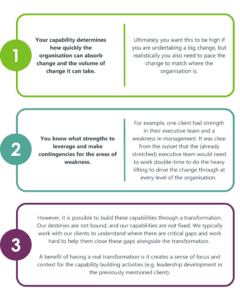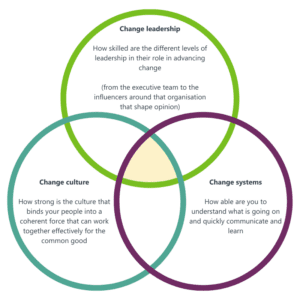
For businesses to secure a sustainable future, they must enhance their ability to adapt and innovate in an ever-evolving marketplace. Here, we’ll explore why change capability is a vital determinant of transformational success and provide two pieces of advice that leaders can leverage to build this key competency.
Reading time: 5 minutes
Repeated studies have shown that most transformation programs don’t deliver on their objectives. ¹ Estimates sit around the 70% ² mark, meaning that your next transformation is likely to take up significant time, focus, and money with a low ROI. While the odds are not good, you have no choice. Being able to transform is in essence a prerequisite to staying competitive and relevant in the market. As they say – ‘evolve or die’.
There are many reasons why transformations fail, but one of the often under-resourced, yet key prerequisites to success is your organisation’s transformation capability. Just as an overweight smoker who struggles to reach 2,000 steps a day will likely fail in their attempt to run a marathon, an organisation that isn’t ‘fit’ will be unlikely to succeed in their efforts to define, design and implement a major strategic change. We frequently observe this scenario in our work with business leaders from all types of organisations.
An organisation we recently supported was seeking to rapidly implement a new line of business where they had minimal success in the past. The leadership were not aligned on what they were aiming to achieve, what it meant, how it would work, or who would be responsible. In addition, you could describe their style of working and ability to collaborate as not very effective. Their plan was to rely on existing internal teams to develop the program side-of-desk; however, many didn’t have experience needed to run this new business or to scale up to meet financial and customer goals.
In fact, there were few – if any – people who could explain how the business would work end-to-end, in part because the existing business was so siloed and specialised. Unsurprisingly, these individuals were already highly engaged and busy as they were the go-to experts for driving change within the organisation.
Looking at these facts as an outsider, you might think that these circumstances would hinder their progress. But they couldn’t see it, and sure enough, big ambitions crashed into the realities of a lack of ability to deliver on the transformation.
¹ Pellettiere (2006); Beer & Nohria (2000); Balugon & Hailey (2004)
² Pellettiere (2006); Kotter (1994); McKinsey (2008)
The investment to build your organisation’s change capability is a worthwhile goal in itself. Typically when we have this conversation, it’s in the context of an already-planned transformation.
Initiating any transformative journey within your organisation necessitates a comprehensive understanding of your current change capabilities. It’s similar to plotting a course on a map; it’s important to know where you are before you can chart a path to your destination. This understanding, which can be achieved through a thorough change capability assessment, is an investment worth its weight in gold. It serves as the starting point of any transformation endeavour, regardless of its scale or complexity.
There are compelling reasons to commence your transformation journey with an in-depth examination of your organisation’s current change capability:

When we talk about organisation capabilities with our clients, they typically think of the tangible, sector-specific elements of their core value-creation efforts.
In media for example, they consider capabilities like content creation or systems that enable addressable advertising as being the most critical to invest in. In a health setting, clinical skills, safety, and quality maintenance systems tend to remain the key considerations.
Less attended to are the softer capabilities that enable the organisation to thrive, adapt and change in the face of a dynamic environment. This ‘organisation change capability’ is a critical source of your competitive advantage; why some organisations can quickly pivot to take advantage of a change in the market (such as we saw during repeated COVID disruptions) while others struggle to adapt and ultimately perish.
Change capability is a mix of organisational and leadership qualities that fall roughly into three buckets:

Each of these components plays a role in helping an organisation change to meet new challenges or take on new opportunities. Leaders play an essential role in bringing people together, shaping opinion and coordinating effort. Without effective leadership you will not be able to move the mass of your organisation out of harm’s way in the face of critical threat.
Culture is the “hard to describe qualities” that connect your people together, creates a sense of comradery and common cause. In the absence of these elements, culture hinders efforts to adapt (e.g. lack of accountability will prevent ownership of the problem or making difficult change happen) while another could help you thrive (e.g. trust will make your people work together and not spend their time looking over their shoulder for internal threats).
There are change systems which enable mindsets and ways of working to shift; to allow new ideas to be tested, shared and spread. For example, effective internal communications channels are essential for ideas to spread and actions to be coordinated. In combination these elements will define how able you are not only to what you should do, but enable you to operate at pace.
At Q5, we think about the whole organisation and how to make change stick, learn more.
We bring a number of ways to help:
So, what happened at the client who seemed doomed to fail?
Are they a 10/10 in their capability for change now? Not yet. But they are well on their way at a strong 8.5/10. By making considered and planful steps they are on a steep trajectory to build a strong and enduring internal capability for change. By taking the steps to future-proof themselves, they are equipped to navigate the inevitable storms ahead with existing structures in place.
If this topic is of interest or you are facing a similar challenge in your organisation. We would love to chat!

Director
